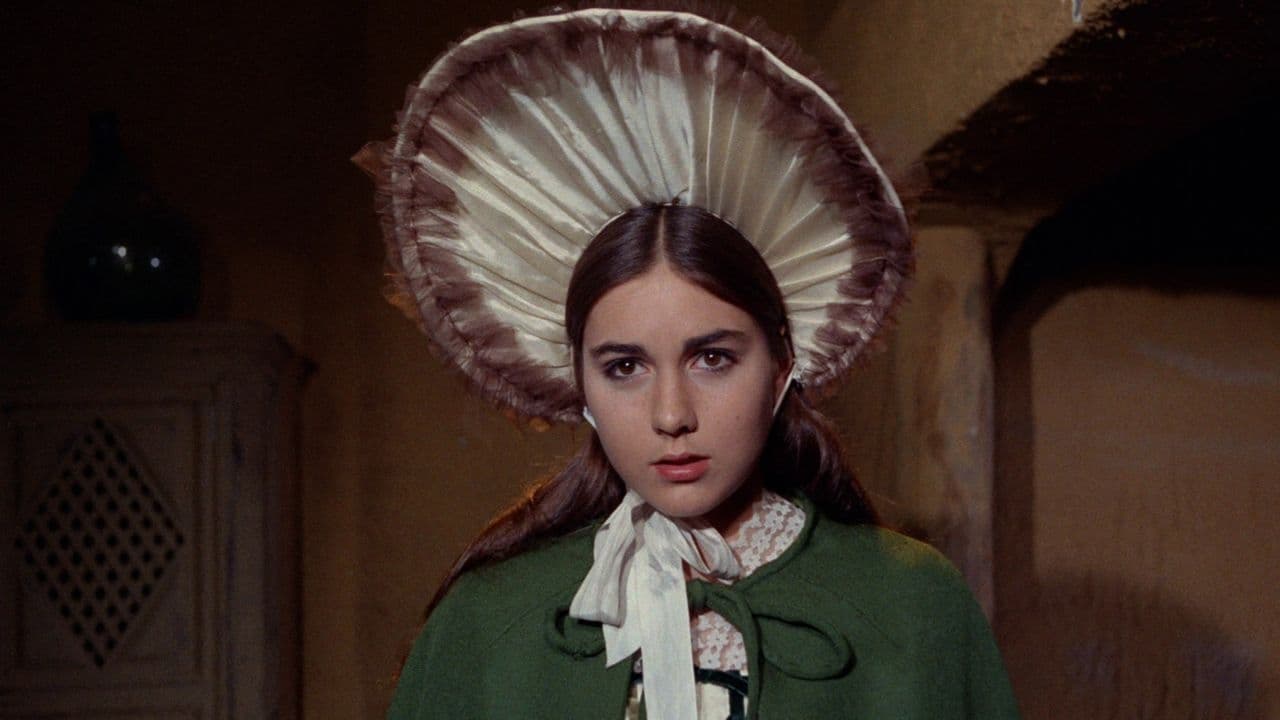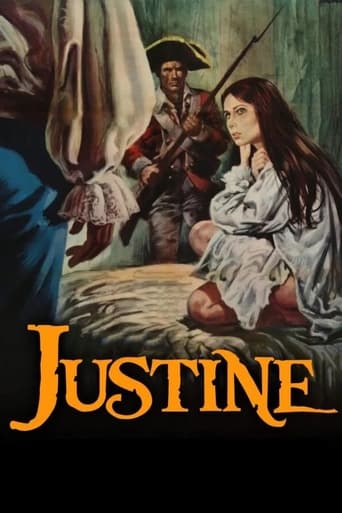

To me, this movie is perfection.
... View MoreThe film's masterful storytelling did its job. The message was clear. No need to overdo.
... View MoreA great movie, one of the best of this year. There was a bit of confusion at one point in the plot, but nothing serious.
... View MoreMostly, the movie is committed to the value of a good time.
... View MoreNearing the end of the ICM poll for the best films of 1969,I decided it was time to look at one of the credits from that year of auteur Uncle Jess Franco. Speaking a few years ago to fellow IMDber melvelvit-1 after seeing the operatic excess of Roger Vadim's fun Vice and Virtue,I was told the Jess had done his own version of the story. Standing out on his credits for '69,I decided it was time to at last meet Justine and Juliet.View on the film:Made during his Harry Alan Towers era, director Jess Franco works with his largest ever budget, (and longest run time?) to conjure up a sleazy kitsch historical Horror epic, with Uncle Jess and cinematographer Manuel Merino layering neon colours over the naked horrors inflicted on Justine. Even when working with a bigger budget, ole Uncle Jess thankfully keeps his major themes intact with Bruno Nicolai's playful Jazz score actually finding (some) sense of the epic, and Jess's unique zoom-ins marking out each humiliation Justine experiences.Producing and writing this adaptation of Marquis de Sade's novel, the screenplay by Harry Alan Towers suffers from being thinly spread over the 2 hours, with sequences where the horror hits the heart of Justine, (such a stylish exchange of poison wine and a dead dog!) that are undermined by Justine then being lost in the wilderness,with little time given to build the relationship between Juliet and Justine. Cut-down by Uncle Jess as acting like a window dummy, Romina Power lacks the daydream daze of Jess's usual leading ladies, but makes up for it with a tempting jail bait innocence over the punishment of Justine.
... View MoreBelieve it or not, i chose to see this film after i saw Malick's Tree of Life. And i did it not because i wanted something completely different, but because i i was looking for some similarly different approach to film. Make no mistakes. Malick's film changed my life, this is just deliberate and utter trash. But here and there, we have directors filming what they want, away from conventions. Both rely heavily on intuition, in Malick's case supported by a heavy baggage of study and reflexion, in Franco's case, supported only by the pure pleasure of filming, or else filming as a living attitude.Trash films are great, because for a few moments we step outside any convention whatsoever. Sex is a given fact in most of these films, it's called exploitation, because we are supposed to be "exploring" bodies, and sex as voyeurs. I would argue that i don't know where that differs from most of our mainstream these days and for a while now, but that's a different talk. Anyway, what we do have a certain guarantee that, within the production constraints, we'll see what some guy or a reduced number of people wanted to do. That's reassuring.Here we have probably the highest budget of any Franco film, probably that in which he was more constrained, at least in therms of casting. The result is not so visceral, not so crazily hallucinating as some bits of others films can be, but there are some rewarding features:-self-reflective filmmaking: Kinski's character writes the story of both sisters as we go along. So we have a filmmaker making a film about a writer (an imprisoned one) who invents 2 parallel narratives about 2 helpless sisters, who are supposed to mirror 2 distinct postures: one is malicious, the other learns to take pleasure out of humiliation. Justine is the one we follow the most;-in her path along humiliation, intrigue, and all kinds of sexual covet by all kinds of people, Justine walks around a number of sets. Some are forgettable, mere trees in incompetently filmed bushes. Some are just ordinary, some are well chosen places in Barcelona (S.Felipe Neri square is the most seductive of them), and some are Gaudí. This is interesting, because the cinematographers, maybe Franco himself, cared about these sets. Generally speaking, the photography in this film is quite good for what we are used to in these films. In Gaudí's places, there is the intention to film space (notice the highly denounced use of wide angle lenses in some places, to the point of distorting the limits and focus of the image), and, in the parks' scenes, to film the promenade along the several arches. Sex and space, that's a fun and rewarding idea. But Romina Power doesn't have a clue, and all falls to a walk in the park, utterly unrewarding in its biggest promise. My opinion: 2/5http://www.7eyes.wordpress.com
... View MoreSisters raised in a convent, Justine, naive & virtuous innocent, and Juliette, wholeheartedly prepared for any wiles of carnal desire the world has to offer, are sent out after the loss of their parents and finances run out. While Juliette dives in head first without a second thought into a wicked world, embracing it to the fullest, Justine is almost like a rabbit tossed into a den of lions. Her trust in people leads to being taken advantage of, penniless, destitute, on the run for crimes she didn't commit, and facing perilous situations towards her life and virginity, seemingly always able just to escape by the skin of her teeth through fate and happenstance. Meanwhile, Juliette, commits the very atrocities Justine is accused of, and rises through society living lavishly, but never emotionally fulfilled. All the while the film returns to the Marquis De Sade(..the always powerful Klaus Kinski, showing a very tormented man seething with agony like an imprisoned zoo animal longing to escape his misfortune), behind a jail cell, alone and haunted by his muses, the very creations of Justine and Juliette as their story unfolds.Essentially a series of (mis)adventures as Justine seeks shelter from a world that wants to devour her..nearly every possible sanctuary from harm seems to hold someone(..or multiple someones)with sinister intent. Just when you think Justine might've finally escaped the evils of the world around her, someone hostile spoils her happiness. While one is branded a thief and murderous who is not guilty of the crimes against her, the other does commits these deeds and reaps the benefits substantially..perhaps the Marquis sees the world through a different pair of eyes, as in his story those who take to committing wicked and carnal acts are rewarded while virtue and innocence leads to mistreatment and cruelty. Or, in order to survive in such a harsh and barbarous environment, one must succeed and triumph by being ever more treacherous, sadistic and savage...obviously the examples of Madame Dusbois(Mercedes McCambridge, living it up in her role as one of those devouring lions who poses a major threat to Justine, even after the poor girl helps her escape prison and a certain hanging for a list of deeds committed against mankind)and Juliette work in this line of reasoning's favor. Yet, by the end, Justine is justified for hanging tough and enduring each and every hardship faced along life's way. Juliette sees that the lifestyle she has lived leaves her an empty void yet unfilled despite being where she is, and Justine, having found love through a kind, handsome artist, has come full circle understanding the world for what it is.I think the story of these two sisters is perfect material for a director like Jesús Franco who operates without restraint working with more of a budget. While I believe many will find the film frustrating as Franco uses zoom and often toys with focus(..although, I think it works to great advantage in the opening as we see De Sade moving throughout his jail cell while the characters of Justine and Juliette take shape in his mind while also presenting themselves "in person"), I think this is one of his best films, using the locations at his disposal to full effect, actually having the ability to establish time and place thanks to period costumes and lavish sets. I think many will find his cast rather average to hammy. I relished McCambridge and LOVED how Franco introduces her. The camera moves with her in frame as Dubois exposes the joy of being who she is..through McCambridge we can see that she basks in the lifestyle she has led up until this point, not expecting to die. I thought Dubois was one of the most entertaining characters in the film, far more lively and ferocious than Romina Power as Justine, whose performance never dramatically cuts the mustard(..it almost appears as if she's about to crack a smile, even as her character faces dangerous situations, remaining fresh-faced and bubbly like a school girl). Franco mentions in an interview that he wanted Rosemary Dexter(who plays Juliette's murdering cohort and lover)for the role of Justine, who could display the pleasures that were starting to form through the agonies occurring to her. I think one can see in her opening scene in the Paris brothel that this would've been more ideal casting..just the way she lies in a room presents something unique and interesting. Maria Rohm fits her seductive role as Juliette, this type of casting works because she has the type of look the character needs. I did think Romina Power had this precocious child-like spirit that Franco elicits for the character of Justine, and she certainly is a gorgeous creature, young with a "post-card" beauty which photographs well, but there's not an iota of depth. Franco admits that he often even shot Power's scenes as Justine when she had no idea they were for the movie! Fans of Jack Palance will revel in his deranged portrayal of a "minister", who operates a sect of monks who use females left behind by the world as examples of their doctrines of pleasure through pain..often almost a drunken buffoon spouting gibberish as if he were on the verge of a nervous breakdown, this might also leave some who have seen Palance elsewhere burying their heads in their laps in embarrassment. I'm not sure if this is the user comment to read because I thoroughly enjoyed the film despite it's various weaknesses. Sure, I agree that Franco doesn't tap into the beast as he could(..because it's certain that there's room for some serious exploitation and brutality that goes unfurled), but I found this film stylistically inspired, specifically his use of color, camera-work, and setting. I do wonder what the film could've been if Franco had been able to use his choice for Justine.
... View MorePoor De Sade, persecuted and imprisoned in his lifetime, misrepresented after his death, and unlike one-time-fellow-prisoner Laclos, author of Dangerous Liaisons, is persecuted and tortured on film. Appalling cinematography, grating music, atrocious acting, and a director who praised Palance's what-was-he-thinking turn and despised the very presence of Power as Justine, although she was almost the only one who wasn't mugging in every scene. What was Mercedes McCambridge on? Dear Klaus Kinski, no wonder he spends his time running desperately from one set of bars to the other: "Get me out of this movie! I'm trapped in it forever!" They even removed his vocal cords. Still, a few points for Power's sweet breasts and eyes, and some other brief anatomical contributions by others. Poor Donatien, even Geoffrey Rush assassinated him while he was dead. At least there is Salo.
... View More